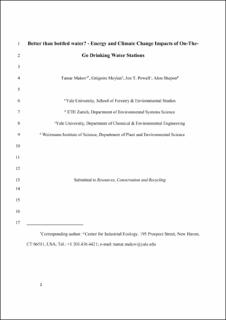Please use this identifier to cite or link to this item:
https://doi.org/10.21256/zhaw-18034| Publication type: | Article in scientific journal |
| Type of review: | Peer review (publication) |
| Title: | Better than bottled water? : energy and climate change impacts of on-the-go drinking water stations |
| Authors: | Makov, Tamar Meylan, Grégoire Powell, Jon T. Shepon, Alon |
| et. al: | No |
| DOI: | 10.1016/j.resconrec.2016.11.010 10.21256/zhaw-18034 |
| Published in: | Resources, Conservation and Recycling |
| Volume(Issue): | 143 |
| Page(s): | 320 |
| Pages to: | 328 |
| Issue Date: | 25-Nov-2019 |
| Publisher / Ed. Institution: | Elsevier |
| ISSN: | 0921-3449 1879-0658 |
| Language: | English |
| Subjects: | Bottled water; Climate change; Decenttralized water system; LCA; Water fountain; Water station |
| Subject (DDC): | 363: Environmental and security problems |
| Abstract: | Growing consumption of single-use bottled water has received criticism due to potentially adverse environmental outcomes. Networks of public-sphere water delivery stations have been proposed as a sustainable alternative for water consumption on-the-go, yet the life-cycle impacts of such stations are poorly understood. Here we evaluate the potential cumulative energy demand and climate change impacts of water delivered from a filtered water refill station under various consumption scenarios and provide a comparison to published results for bottled water. Using a hybrid life-cycle analysis framework employing physical and economic data, we model the water station’s performance in four locations:Tel-Aviv, Israel; Miami Beach, Florida, USA; London, UK; and Shanghai, China. We find that the climate change impact of the station is two to six times lower than those of bottled water and that use phase electricity is the most influential factor in determining the station’s environmental impact. We provide additional observations related to scaling up such a system and recommendations to realize further gainsin eco-efficiency. |
| URI: | https://digitalcollection.zhaw.ch/handle/11475/18034 |
| Fulltext version: | Accepted version |
| License (according to publishing contract): | CC BY-NC-ND 4.0: Attribution - Non commercial - No derivatives 4.0 International |
| Restricted until: | 2021-04-30 |
| Departement: | School of Management and Law |
| Organisational Unit: | International Management Institute (IMI) |
| Appears in collections: | Publikationen School of Management and Law |
Files in This Item:
| File | Description | Size | Format | |
|---|---|---|---|---|
| Makov et al (2016)_Water Station Network.pdf | Accepted Version | 2.25 MB | Adobe PDF |  View/Open |
Show full item record
Makov, T., Meylan, G., Powell, J. T., & Shepon, A. (2019). Better than bottled water? : energy and climate change impacts of on-the-go drinking water stations. Resources, Conservation and Recycling, 143, 320–328. https://doi.org/10.1016/j.resconrec.2016.11.010
Makov, T. et al. (2019) ‘Better than bottled water? : energy and climate change impacts of on-the-go drinking water stations’, Resources, Conservation and Recycling, 143, pp. 320–328. Available at: https://doi.org/10.1016/j.resconrec.2016.11.010.
T. Makov, G. Meylan, J. T. Powell, and A. Shepon, “Better than bottled water? : energy and climate change impacts of on-the-go drinking water stations,” Resources, Conservation and Recycling, vol. 143, pp. 320–328, Nov. 2019, doi: 10.1016/j.resconrec.2016.11.010.
MAKOV, Tamar, Grégoire MEYLAN, Jon T. POWELL und Alon SHEPON, 2019. Better than bottled water? : energy and climate change impacts of on-the-go drinking water stations. Resources, Conservation and Recycling. 25 November 2019. Bd. 143, S. 320–328. DOI 10.1016/j.resconrec.2016.11.010
Makov, Tamar, Grégoire Meylan, Jon T. Powell, and Alon Shepon. 2019. “Better than Bottled Water? : Energy and Climate Change Impacts of On-the-Go Drinking Water Stations.” Resources, Conservation and Recycling 143 (November): 320–28. https://doi.org/10.1016/j.resconrec.2016.11.010.
Makov, Tamar, et al. “Better than Bottled Water? : Energy and Climate Change Impacts of On-the-Go Drinking Water Stations.” Resources, Conservation and Recycling, vol. 143, Nov. 2019, pp. 320–28, https://doi.org/10.1016/j.resconrec.2016.11.010.
Items in DSpace are protected by copyright, with all rights reserved, unless otherwise indicated.